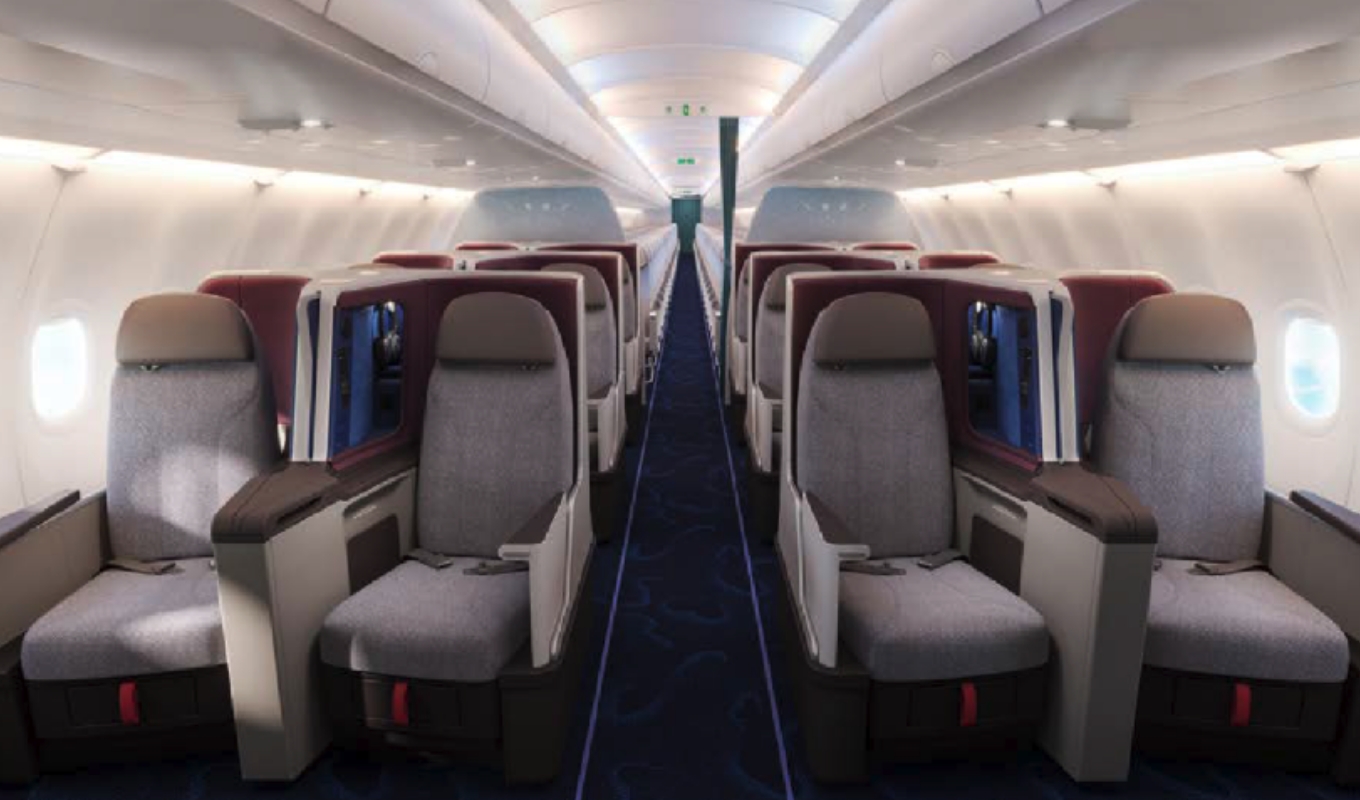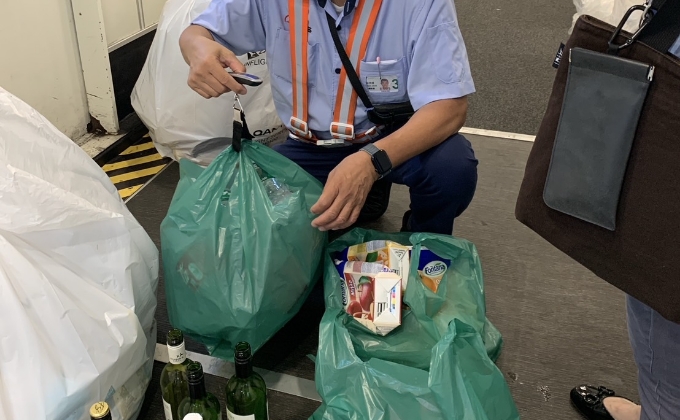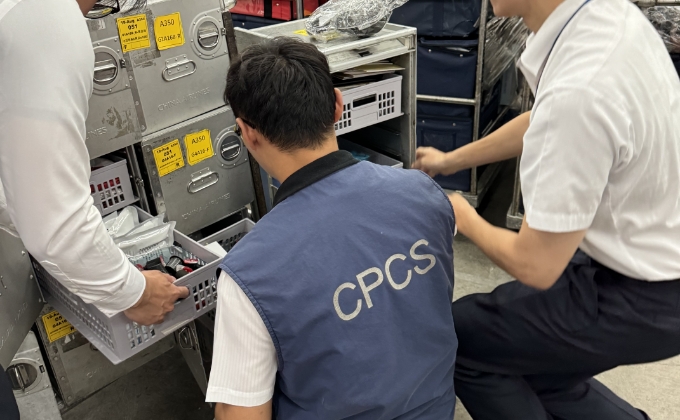ECO Services
From the very start of the journey, we integrate environmental sustainability by designing, planning, and implementing various ECO services. We hope passengers will join us, step by step, toward a future with greater ecological benefits.
Energy-efficient Aircraft
China Airlines continues to advance its fleet renewal program with a solid strategy to strengthen its global passenger and cargo market presence. In 2024, the airline introduced one leased A350-900, four A321neo passenger aircraft, and two 777F freighters. In 2025, in addition to further A321neo deliveries, China Airlines will welcome a new Boeing 787 fleet, offering enhanced passenger and cargo services with a modernized and younger fleet. Currently, the airline operates 10 Boeing 737-800 passenger planes with an average age of 9.5 years, which are planned to be gradually retired by 2028 in line with the A321neo introduction.
Regarding cabin amenities, China Airlines embraces innovation to resonate with younger generations by upgrading digital experiences while ensuring comfort and environmental friendliness:
- The in-flight entertainment system now offers premium podcast services, enhanced movie quality, and unlimited downloads of hundreds of publications through the digital magazine "Dynasty Sky Reading."
- On A321neo and 737-800 aircraft, passengers can connect personal electronic devices to the in-flight entertainment system for seamless multimedia streaming at altitude.
- To improve product consistency across fleets and cabin competitiveness, China Airlines is upgrading the A350-900 cabins with the latest seating and next-generation high-definition personal entertainment systems, featuring high-spec, customized cabin equipment aligned with industry trends.



Ticket Service
China Airlines continuously enhances the smoothness of booking and ticketing on its website and app, while strengthening online itinerary management services. The website’s information presentation is streamlined and page design optimized for intuitive browsing and easy access to travel details such as baggage policies, fare products, special requests, and flight status. Passengers can also complete booking, check-in, seat and meal selection, chatbot service, and access 14 comprehensive services including Dynasty Sky Reading online. Electronic boarding passes are adopted to reduce paper use, and all printed boarding passes are produced on FSC-certified paper.
Airport Services
Through procuring large-sized bottled beverages, local food ingredients, implementing waste classification and recycling, and strengthening the improvement of energy-saving lighting and energy management, CAL oversees VIP service quality and environmental loads.
To provide passengers with a fresh experience when checking in via the China Airlines app, the electronic boarding pass screen features exclusive designs for different festivals. Whether it’s the joyful Lunar New Year, the culturally rich Dragon Boat and Mid-Autumn Festivals, or the warm and heartfelt Christmas, each e-boarding pass incorporates carefully crafted festive illustrations. This adds a celebratory atmosphere to the journey, allowing passengers to feel the holiday spirit and China Airlines’ thoughtful care from the moment they begin their trip.

Strict Controls over Water Quality on Aircraft
CAL has laid out drinking water treatment processes, adopted controls for pre- and post-flight water refill and disinfection processes to protect the quality of drinking water and prevent resource wastage.

Before water refilling:
- Strictly select qualified ground handling agents to perform aircraft water filling operations. The water samples shall be sent to go through multiple filtration equipment and chlorination to guarantee good quality.
- Water samples shall be sent regularly to qualified laboratory for inspection to ensure compliance with national drinking water standards.
- For stations with high risk of water supply, the aircraft refilling will be conducted in previous station with qualified water standard, or mineral bottled water will be used.
Water supply procedure
- In a period of refilling, added extra cartridge depending on the operational risks; Activated Carbon Filters were added in the outlet of potable water equipment in the aircraft.
- Supervise the quality of water supply service strictly to ensure the water supply source meets the standards.
- Analyze and manage the water consumption of outstations, and reduce unnecessary waste of water resources by appropriately controlling the water supply , thus reducing water consumption, fuel consumption and carbon emissions.
Potable water self-testing and disinfecting of aircraft potable water system:
- Ahead of other Taiwan’s airlines incorporate environmental management system to water management and audit plan; Regular and random water quality monitoring, water inspection shall be carried out by qualified laboratory.
- Inspection frequency for disinfect tank and replace filter which are stricter than the manufacturer manual.
- If the aircraft has on overnight stop in outstations, the aircraft water tank and the remaining water in the pipeline will be drained to avoid bacteria breeding.
- Perform regular and random water quality monitoring and inspecting every year. If abnormal conditions happened (e.g. water with impurity, polluted water), on-board water supply will be stopped immediately, disinfection operations will be conducted and water samples will be sent for analysis and inspection to ensure the water quality meets national standards.
Waste Management for Passenger and Cargo Services
- China Airlines has implemented several sustainability initiatives in response to international concerns about reducing cabin waste. On twin-aisle aircraft, they have promoted onboard waste sorting and recycling, and in 2024, they restarted waste weighing and surveys following IATA and ASF methodologies to optimize meal and supplies planning. They also conduct educational training to ensure quality execution and effective results.
- In partnership with China Pacific Catering Services (CPCS), they promote green transformation and food waste reduction by practicing energy saving, carbon reduction, and waste reduction from procurement, production to distribution. CPCS ensures food safety and quality through ISO and HACCP certifications and has expanded into ready-to-eat foods and corporate catering to extend sustainability concepts into daily life.
- Responding to the trend of plastic reduction, from November 2024, China Airlines switched to stainless steel cutlery and increased the use of sustainably certified paper and wood packaging materials. They introduced multiple recycled and renewable material products to reduce resource consumption and biodiversity impact.
- In cargo operations, recycled tarpaulins and packaging materials have been introduced to implement recycling and reuse mechanisms, realizing comprehensive environmental protection actions.
| Principle | Waste Management | Food loss and Waste Management | Reduce Single-use Plastics / Packaging |
|---|---|---|---|
| Prevent |
|
|
|
| Reduce |
|
|
|
| Reuse |
|
|
|
| Recycle |
|
|
|
| Recovery |
|
||
Cabin Waste Weighing Project
To identify opportunities for cabin waste reduction, China Airlines collaborated with its ground handling agent in December 2019 to collect, inventory, and analyze waste generated on selected short- and long-haul flights. Building on this, CAL optimized the waste weighing procedures and task allocation in August 2024. The project also referenced the operational practices from the Aviation Sustainability Forum (ASF) to enhance the collection of pre-flight information, post-flight data analysis, and strategic feedback.
Results from the 2024 Cabin Waste Weighing Project showed per-passenger waste of 0.5 kg on short-haul and 0.81 kg on long-haul flights—both lower than 2019 figures and ASF benchmarks. The composition review highlighted future focus areas such as flight duration, passenger schedules, and packaging design to balance passenger experience with waste reduction.


2024 Cabin Waste Weighing Project: Figure A - Weighing of Cabin Cleaning Waste; Figure B - Weighing of Cabin Catering Waste.
Wide-Body Passenger Aircraft Waste Recycling
In alignment with China Airlines' Environmental and Energy Policy, and to provide opportunities for the development of a circular economy, recycling operations for twin-aisle aircraft were implemented in phases on transoceanic and regional routes in 2023 and 2024, using dedicated recycling carts “ECO CART”.
Workflow
| Phase | Operation Details |
|---|---|
| Flight Preparation |
|
| During Flights |
|
| After Landing |
|
Eco-Friendly and Stylish In-Flight Amenity Kit
In line with China Airlines' commitment to environmental sustainability, in 2024, the Premium Business Class amenity kit collaborated with the trendy luxury brand MOSCHINO, while the Premium Economy Class kit collaborated with Canadian outdoor lifestyle brand Roots, offering a compact and convenient travel pouch. The contents are provided in collaboration with the highly acclaimed brand Moroccanoil, featuring a selection of practical skincare products. Furthermore, every element—from the pouch and contents to the packaging materials—is designed with environmental sustainability in mind. Recycled plastic is used in the production of the pouch, skincare bottles, eye mask, comb, and luggage tag. The toothbrush is made from wheat-based materials, while the outer bags for skincare products are composed of PLA material, and the outer bags for travel pouches utilize CPE biodegradable plastic. Additionally, the paper belly bands, wax paper for the dental kits, kraft paper box for earplugs, and informational cards are all made from FSC-certified materials sourced from legally and responsibly managed forests, reducing the environmental impact of both the products and their packaging.

A newly designed, eco-friendly in-flight amenity kit for Premium Business Class

A newly designed, eco-friendly in-flight amenity kit for Premium Economy Class
Onboard Service

Green Freight
Aside from renewing the fleet, CAL is also committed to improving the overall freight and logistics operational and energy efficiency. Through continually combining the partners from upstream and downstream and supply chain management, CAL actively supports the IATA e-freight paperless initiative and promote mobile and electronic service processes, as well as sustainable management of freight packaging materials. Additionally, it CAL promotes carbon offset and SAF programs with corporate members, striving to improve the overall ecological efficiency of its logistics operations.

Implement Conservation Policies
CAL recognizes that forest and biodiversity conservation contribute to climate stability and the sustainability of agriculture, food, public health, and economics. Moreover, they are key foundations for building global climate and environmental resilience. CAL has implemented the transportation policy of embargoing shark fins and experimental primates, has prohibited the use of protected species as food ingredients in the Groups’ service, has signed the United for Wildlife Transport Taskforce Buckingham Palace Declaration , and also has pledged to lead the Group and supply chain partners to jointly promote the operation of No Net Loss of biodiversity and Zero Deforestation through responsible procurement and supplier management practices. With continuous implementation of CAL’s “ Sustainable Development Best Practice Principles ”, “ Environmental and Energy Policy Statement ”, “ Sustainable Supply Chain Management Policy Statement ”, “ Supplier Code of Conduct ”, and “ Forest and Biodiversity Conservation Commitment ”, we aim to achieve the United Nations Sustainable Development Goals and combat global illegal wildlife trade.